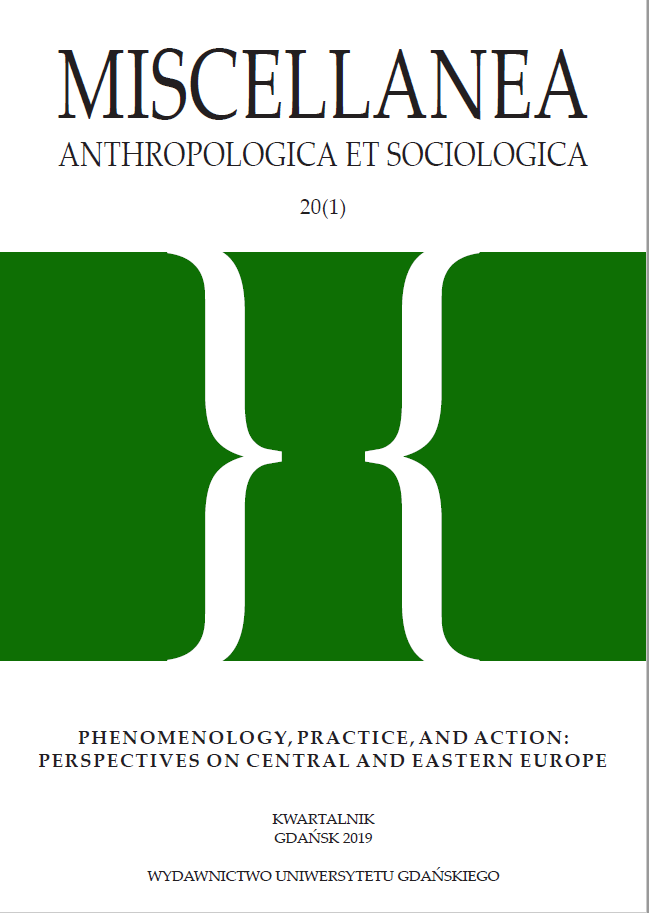Heidegger’s Critique of Causal Explanation in Relation to Psychotherapy. Critical Sketches on Heidegger’s “Zollikon Seminars”
DOI:
https://doi.org/10.26881/maes.2019.1.07Słowa kluczowe:
Heidegger, phenomenology, psychopathology, causal explanation, Dasein, psychiatry, human being, determinism and freedomAbstrakt
The article represents a critical re-evaluation of the contribution to psychiatry and psychotherapy made by Heidegger. The author gives a detailed analysis of “Zollikon Seminars”, placing emphasis on Heideggerian concept of the human being in the first part of the article. According to Heidegger, the human being is not just present in the world, but he is present in the world along with other beings, he exists in indissociability with things, with the world. The existence of the human being, but not its interpretation, which reduces the concept of the human being to thinking, consciousness or instinct, represents the starting point of his philosophical inquiry. But that, which ever-already is, needs to be given an opportunity to show itself. Therefore, the matter of the causal explanation, given with a view to psychotherapy became one of the focal points for “Zollikon Seminars”. The second part of the article is devoted to critique of Freud, delivered by Heidegger, which clarified Heidegger’s approach to the existence of the human being through the striking antithesis of causality and motivation and critique of the causal explanation. The third part of the article comprises a reference to psychopathology and the practice of psychiatry, which, according to our reckoning, Heidegger has elided in his reflections. It is fair to assume that, if Heidegger gave consideration to the uniqueness of the psychopathology practice, which its phenomena appear in, with regard to the causal explanation, his intuition on this subject, concerning a radical distinction between the realm of freedom and the realm of causality, could take a different direction. Having examined the critique, delivered by him, more intently, we are able to say that Heidegger, despite his innovative approach, still, did not take into consideration a number of problems, being present in the practice of psychotherapy and psychiatry. Nevertheless, the importance of Heideggerian approach resides primarily in a fact that Heidegger, for his part, insisted on the “productive meeting” of philosophers and psychiatrists, meant to amend understanding of the practice of psychiatry. An opportunity to combine the causal and the hermeneutic approaches in psychiatry was not considered by Heidegger, although, it seems to us, it is exactly the practice of psychiatry, which the “meeting” of the causal theory and philosophy can become really potentially productive and “stimulating” in.
Downloads
Bibliografia
Artemenko N., 2017, Critical Sketches on Heidegger’s “Zollikon Seminars” [in:] T.V. Shchittzova (ed.), Zollikon Seminars: Comments and Interpretations, Vilnius: Logvino literatūros namai, pp. 165–192 (in Russian).
Bolton D., Hill J., 1996, Mind, Meaning and Mental Disorder. The Nature of Causal Explanation in Psychology and Psychiatry, Oxford: Oxford University Press.
Boss M., 1963, Psychoanalysis and Daseinsanalysis, New York: Basic Books.
Dallmayr F., 1993, Heidegger and Freud, “Political Psychology. Political Theory and Political Psychology”, no. 14(2), pp. 235–253.
Gadamer H.-G., 1993, Über die Verborgenheit der Gesundheit, Frankfurt a. M.: Suhrkamp.
Heidegger M., 2001, Zollikon Seminars. Protocols-Conversations-Letters, transl. F. Mayr and R. Askay, Evanston, Ollinois: Northwestern University Press.
Heidegger M., 2010, Being and Time, transl. J. Stambaugh, Albany: State University of New York Press.
Heidegger M., 1989, Phänomenologische Interpretationen zu Aristoteles (1922), DiltheyJahrbuch für Philosophie und Geschichte der Geisteswissenschaften, no. 6, pp. 235–269.
Heidegger M., 1998, On the Essence and Concept of Φύσιζ in Aristotle’s Physics B, I (1939) [in:] W. McNeill (ed.), Pathmarks, Cambridge: Cambridge University Press, pp. 183–230.
Jackson J.M., 2007, Questioning and the Materiality of Crisis: Freud and Heidegger, Philosophy & Social Criticism, vol. 33(2), pp. 251–269.
Kouba P., 2015, The Phenomenon of Mental Disorder. Perspectives of Heidegger’s Thought in Psychopathology, Switzerland: Springer International Publishing.
Meynen G., Verburgt J., 2009, Psychopathology and Causal Explanation in Practice. A Critical Note on Heidegger’s Zollikon Seminars, Medicine, Health Care and Philosophy, no. 12, pp. 57–66.
Sheehan J.T., 1975, Heidegger, Aristotle, and Phenomenology, Philosophy Today, vol. 19, no. 2/4, pp. 87–94.

 Uniwersyteckie Czasopisma Naukowe
Uniwersyteckie Czasopisma Naukowe




